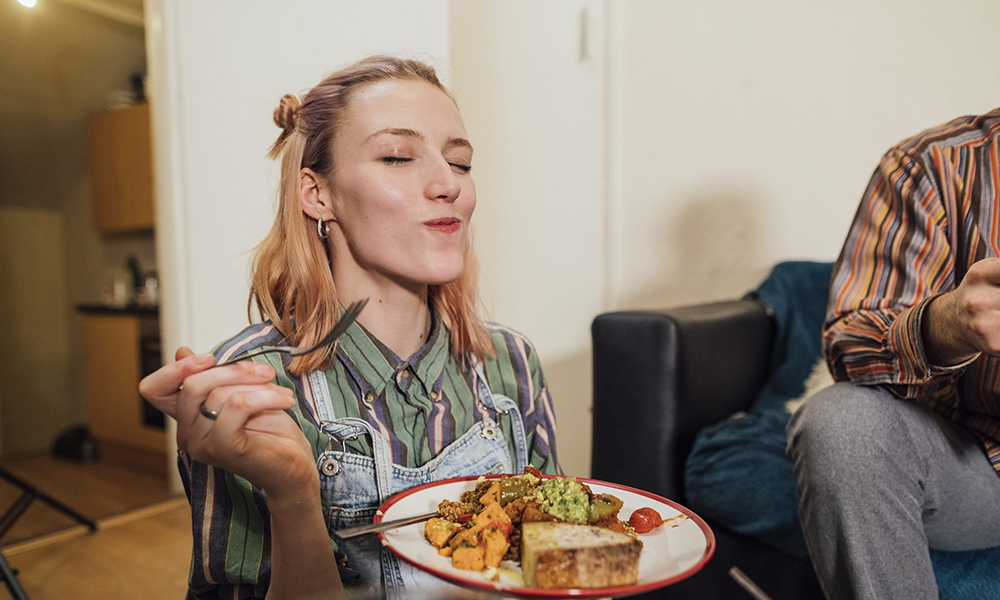
連鎖沙拉店Sweetgreen將在其菜單中增加牛排。這則消息在網(wǎng)上引起了激烈反響,,顧客紛紛質(zhì)疑這會(huì)對(duì)該公司的碳中和計(jì)劃產(chǎn)生哪些影響,。
創(chuàng)建于2007年的Sweetgreen是一家供應(yīng)沙拉和素食碗的快速休閑餐廳,聲稱將于2027年實(shí)現(xiàn)碳中和,,這意味著它計(jì)劃執(zhí)行策略抵消自身的碳排放,,同時(shí)減少大氣中的碳排放。
但牛肉生產(chǎn)需要消耗大量資源,,是導(dǎo)致氣候變化的原因之一,。牛肉生產(chǎn)是全球最大的農(nóng)業(yè)溫室氣體排放源,這個(gè)過程會(huì)向大氣排放大量甲烷,,而且需要使用大量土地,。
Sweetgreen上周宣布在菜單中添加香煎咖喱牛排,這一爭(zhēng)議舉動(dòng)背后的理由包括使用再生農(nóng)業(yè),。該連鎖餐廳還表示,,碳抵消是其應(yīng)對(duì)氣候變化和減少溫室氣體排放這一承諾的一部分。
Sweetgreen在回應(yīng)置評(píng)請(qǐng)求時(shí),,建議參考關(guān)于增加菜單的詳細(xì)通告,。什么是再生農(nóng)業(yè)?
密歇根州立大學(xué)再生農(nóng)業(yè)中心(Michigan State University Center for Regenerative Agriculture)的聯(lián)席主任賈森·朗特里稱,,再生農(nóng)業(yè)是指耕種和飼養(yǎng)牲畜不僅能夠從自然環(huán)境中收獲農(nóng)產(chǎn)品,,還可以改善生態(tài)環(huán)境。
朗特里指出,,這意味著“盡量減少干擾,,保持地面覆蓋”,并且“通過在耕種系統(tǒng)中增加動(dòng)物或增強(qiáng)地下生物,,改善地下和地上的生物多樣性”,。
許多食品雜貨連鎖店和餐廳開始選擇通過再生農(nóng)業(yè)獲得動(dòng)物蛋白、谷物,、水果和蔬菜,,同時(shí)實(shí)現(xiàn)氣候目標(biāo),。星巴克(Starbucks)將再生農(nóng)業(yè)作為到2030年減少一半的碳排放、用水和浪費(fèi)的一種方法,。Chipotle和漢堡王(Burger King)也開始涉足再生農(nóng)業(yè),。
農(nóng)業(yè)咨詢公司Understanding Ag的創(chuàng)始人、農(nóng)民艾倫·威廉姆斯說:“關(guān)鍵在于你做了什么以及如何落實(shí),。再生農(nóng)業(yè)能夠修復(fù),、重建和恢復(fù)我們的生態(tài)系統(tǒng)——如果我們想要減緩氣候變化,再生農(nóng)業(yè)將至關(guān)重要,?!?/p>
有專家質(zhì)疑再生農(nóng)業(yè)能否抵消牛肉生產(chǎn)產(chǎn)生的所有排放。什么是碳抵消,?
各行各業(yè)的公司,,包括餐飲公司,都在購(gòu)買碳抵消額度,。它們購(gòu)買“碳信用額度”,,信用額度是一個(gè)自愿的,、不受監(jiān)管的市場(chǎng)的一部分,,適用于聲稱可吸收本來可能產(chǎn)生的二氧化碳排放的項(xiàng)目。
碳抵消的目的是抵消自身的二氧化碳污染,。但這并不是一門精準(zhǔn)的科學(xué),。
氣候非營(yíng)利組織Project Drawdown的執(zhí)行總監(jiān)喬納森·弗利表示,雖然Sweetgreen等公司的努力值得稱贊,,但“眾所周知,,毫不夸張地說,過去幾年碳抵消確實(shí)存在問題”,。有哪些其他解決方案,?
即使一家連鎖店采用富有成效的再生農(nóng)業(yè)和碳抵消,專家們認(rèn)為它使用塑料,、紙張或不可再生能源,,會(huì)讓這些努力付諸流水。
因此,,專家們認(rèn)為,,當(dāng)務(wù)之急應(yīng)該是關(guān)注連鎖餐廳的整體碳足跡,培養(yǎng)和改善對(duì)食品安全更有韌性的局面,,并改善水循環(huán),。
朗特里說:“歸根結(jié)底,我認(rèn)為干旱以及長(zhǎng)期干旱之后的強(qiáng)降雨,,可能是未來農(nóng)業(yè)面臨的最大挑戰(zhàn),?!保ㄘ?cái)富中文網(wǎng))
譯者:劉進(jìn)龍
審校:汪皓
連鎖沙拉店Sweetgreen將在其菜單中增加牛排。這則消息在網(wǎng)上引起了激烈反響,,顧客紛紛質(zhì)疑這會(huì)對(duì)該公司的碳中和計(jì)劃產(chǎn)生哪些影響,。
創(chuàng)建于2007年的Sweetgreen是一家供應(yīng)沙拉和素食碗的快速休閑餐廳,聲稱將于2027年實(shí)現(xiàn)碳中和,,這意味著它計(jì)劃執(zhí)行策略抵消自身的碳排放,,同時(shí)減少大氣中的碳排放。
但牛肉生產(chǎn)需要消耗大量資源,,是導(dǎo)致氣候變化的原因之一,。牛肉生產(chǎn)是全球最大的農(nóng)業(yè)溫室氣體排放源,這個(gè)過程會(huì)向大氣排放大量甲烷,,而且需要使用大量土地,。
Sweetgreen上周宣布在菜單中添加香煎咖喱牛排,這一爭(zhēng)議舉動(dòng)背后的理由包括使用再生農(nóng)業(yè),。該連鎖餐廳還表示,,碳抵消是其應(yīng)對(duì)氣候變化和減少溫室氣體排放這一承諾的一部分。
Sweetgreen在回應(yīng)置評(píng)請(qǐng)求時(shí),,建議參考關(guān)于增加菜單的詳細(xì)通告,。什么是再生農(nóng)業(yè)?
密歇根州立大學(xué)再生農(nóng)業(yè)中心(Michigan State University Center for Regenerative Agriculture)的聯(lián)席主任賈森·朗特里稱,,再生農(nóng)業(yè)是指耕種和飼養(yǎng)牲畜不僅能夠從自然環(huán)境中收獲農(nóng)產(chǎn)品,,還可以改善生態(tài)環(huán)境。
朗特里指出,,這意味著“盡量減少干擾,,保持地面覆蓋”,并且“通過在耕種系統(tǒng)中增加動(dòng)物或增強(qiáng)地下生物,,改善地下和地上的生物多樣性”,。
許多食品雜貨連鎖店和餐廳開始選擇通過再生農(nóng)業(yè)獲得動(dòng)物蛋白、谷物,、水果和蔬菜,,同時(shí)實(shí)現(xiàn)氣候目標(biāo)。星巴克(Starbucks)將再生農(nóng)業(yè)作為到2030年減少一半的碳排放,、用水和浪費(fèi)的一種方法,。Chipotle和漢堡王(Burger King)也開始涉足再生農(nóng)業(yè)。
農(nóng)業(yè)咨詢公司Understanding Ag的創(chuàng)始人,、農(nóng)民艾倫·威廉姆斯說:“關(guān)鍵在于你做了什么以及如何落實(shí),。再生農(nóng)業(yè)能夠修復(fù)、重建和恢復(fù)我們的生態(tài)系統(tǒng)——如果我們想要減緩氣候變化,,再生農(nóng)業(yè)將至關(guān)重要,?!?/p>
有專家質(zhì)疑再生農(nóng)業(yè)能否抵消牛肉生產(chǎn)產(chǎn)生的所有排放。什么是碳抵消,?
各行各業(yè)的公司,,包括餐飲公司,都在購(gòu)買碳抵消額度,。它們購(gòu)買“碳信用額度”,,信用額度是一個(gè)自愿的、不受監(jiān)管的市場(chǎng)的一部分,,適用于聲稱可吸收本來可能產(chǎn)生的二氧化碳排放的項(xiàng)目,。
碳抵消的目的是抵消自身的二氧化碳污染。但這并不是一門精準(zhǔn)的科學(xué),。
氣候非營(yíng)利組織Project Drawdown的執(zhí)行總監(jiān)喬納森·弗利表示,,雖然Sweetgreen等公司的努力值得稱贊,但“眾所周知,,毫不夸張地說,,過去幾年碳抵消確實(shí)存在問題”。有哪些其他解決方案,?
即使一家連鎖店采用富有成效的再生農(nóng)業(yè)和碳抵消,,專家們認(rèn)為它使用塑料、紙張或不可再生能源,,會(huì)讓這些努力付諸流水,。
因此,,專家們認(rèn)為,,當(dāng)務(wù)之急應(yīng)該是關(guān)注連鎖餐廳的整體碳足跡,培養(yǎng)和改善對(duì)食品安全更有韌性的局面,,并改善水循環(huán),。
朗特里說:“歸根結(jié)底,我認(rèn)為干旱以及長(zhǎng)期干旱之后的強(qiáng)降雨,,可能是未來農(nóng)業(yè)面臨的最大挑戰(zhàn),。”(財(cái)富中文網(wǎng))
譯者:劉進(jìn)龍
審校:汪皓
Salad chain Sweetgreen is adding steak to its menu, an announcement that led to strong reactions online, with customers questioning how that would impact the company’s carbon neutral plans.
Founded in 2007 and known as a fast-casual spot serving salads and bowls, Sweetgreen says it will be carbon neutral by 2027 — meaning it plans to offset its own emissions by putting in place strategies that also remove carbon from the atmosphere.
But beef production is incredibly resource-intensive and a contributor to climate change. It’s the largest agricultural source of greenhouse gases globally, emitting massive amounts of methane into the atmosphere, and requires extensive land use.
Sweetgreen’s rationale for the controversial caramelized, garlic-flavored steak menu addition last week includes using regenerative farming. The chain also says carbon offsets are part of its pledge to combat climate change and reduce its greenhouse gas emissions.
A Sweetgreen spokesperson referred request for comment to its menu expansion details.What is regenerative agriculture?
Regenerative agriculture means farming and ranching in a way that not only produces food from a landscape, but also sees that landscape improve ecologically, said Jason Rowntree, co-director of the Michigan State University Center for Regenerative Agriculture.
This means “minimizing disturbance, keeping ground covered,” Rowntree said, “improving biodiversity below and above ground through adding animals to your cropping systems or enhancing biology below ground.”
Many grocery chains and restaurants are starting to look to regenerative agriculture for animal proteins, grains and fruits and vegetables while meeting climate goals. Starbucks cited regenerative agriculture as one way it aims to slash its carbon, water use and waste in half by 2030. Chipotle and Burger King have also dabbled in it.
“It’s all in what you do and how you implement it,” said Allen Williams, a farmer and founder of agriculture consultancy Understanding Ag. “It allows for the repair, rebuilding and restoration of our ecosystems — and that’s critically important if we want to mitigate climate change.”
Some experts question whether regenerative agriculture can offset all emissions from beef production in particular. What are carbon offsets?
Companies, including those in dining, also buy carbon offsets. They purchase “credits,” as part of a voluntary and unregulated market for projects that claim to absorb carbon dioxide that otherwise would’ve happened.
These offsets are an effort to cancel out one’s own carbon dioxide pollution. But it isn’t an exact science.
Though companies including Sweetgreen should be applauded for their efforts, “We all know that the offsets schemes over the last few years have been really problematic, to say the least,” said Jonathan Foley, executive director of climate nonprofit Project Drawdown. What can be done instead?
Even if a chain employs productive regenerative agriculture and offsets, experts say its use of plastic, paper or non-renewable energy could negate those practices.
So the priority should be focusing on a restaurant chain’s whole carbon footprint, fostering and improving landscapes that are more resilient for food security and improving water cycling, experts say.
“At the end of the day,” Rowntree said, “I think these challenges we’re going to see with aridity, with heightened intensity of rain events followed by longer periods of drought are probably agriculture’s biggest challenge moving forward.”






